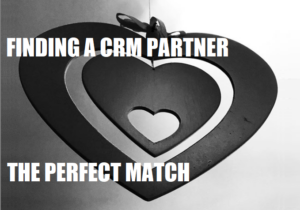It’s Valentines’ Day and whilst some of us will be impressing our partners with romantic gestures, others will be trying to find “the one” via matchmaking websites, blind dates that friends set up etc. Which got me thinking about finding “the one” when it comes to sussing out a potential CRM Partner – how do you find your perfect match?
Much like most meaningful relationships, your ideal CRM Partner should tick certain boxes. So here’s some food for thought:
What does the CRM Partner have to offer?
Sure, you want someone who can come up with the desired goods, but how exactly are they going to do this? Unless you’re pretty self-sufficient and just need something off-the-shelf, then consider what your business requirements are and find out if your potential CRM Partner can meet those needs. For example, are they willing and able to take the time and effort to understand the nature of your business and your strategy so that the right CRM solution is selected for you? Are they willing to recommend alternatives if they can’t directly help you out?
Is the CRM Partner willing to work at it?
A CRM system is never just “ready to go” when you’ve purchased it. You need to shape the database so that the information you collect is valuable and will provide you with the intelligent business insights that you need. You need to set up certain automated processes in order to make things run efficiently and accurately. You need to ensure you comply by certain rules, such as GDPR. There are many things you need to do in order to make the CRM system “your own.” So, again, is the CRM Partner willing and able to invest the time and energy into helping you shape up the system so that it fits your business requirements and strategy?
Still – shaping the CRM product may not be enough. If that’s the case, does the CRM Partner have the capacity to scope and develop the CRM software and/or integrate add-on products should an off-the-shelf solution not be sufficient? Your business is unique and one size doesn’t always fit all – and sometimes adjustments are needed to ensure a good fit. You should never have to “make do” with what’s already there if you’re not quite happy with the quick and easy option. A good CRM partner will work with you to build a solution that will truly help you acquire, retain and develop your customer relationships.
Are they in it for the long haul?
Can they stick around post-implementation to see how you’re doing, in case there are technical teething issues or questions raised – immediately after deployment as well as in the long run? We all need a bit of support – sometimes more than others. Find out what their support infrastructure is like, what terms and conditions are attached to those, and how much it will cost you.
Will they go on your CRM journey with you?
Are they able to help you learn, grow and develop your team as you embark on your CRM journey? It’s not easy starting something new – cultural shifts are needed to get everyone on board, and dedicated, bespoke tutorials are essential if everyone is to understand how to use the CRM system and what’s in it for them.
A good CRM Partner will also help you to help yourselves along your journey, so that you don’t have to completely rely on their help 24/7. They should help you appoint and coach a CRM champion who will do the hand-holding for new-starters; to detect problems when they arise and resolve them accordingly; to ensure the CRM database quality is maintained at a good level; to encourage and inspire users to get the most out of the CRM system; to be actively involved with maturing the CRM system.
Will the CRM Partner nurture their relationship with you?
Just how long are they willing to stick around for? CRM systems, like relationships, are never static – they grow and change over time as internal and external forces come into play. This organic growth also needs managing – for example, by regular account management and systems auditing. Will the CRM partner be there for you when you need them, in good times as well as the bad?
Your CRM Partner shouldn’t just do account management when there’s a problem, or when practical matters need attending to, such as buying more software licences as your team grows. Account management – or customer success management, as the term has recently become – should also take place when the business is thriving so that actions can be taken to ensure the CRM infrastructure is able to cope with the growth and development. Your CRM Partner should be there for you – for better or worse.
So as we celebrate Valentines’ Day with chocolate and champagne, here’s hoping that you’ll find your perfect match in a CRM Partner!





